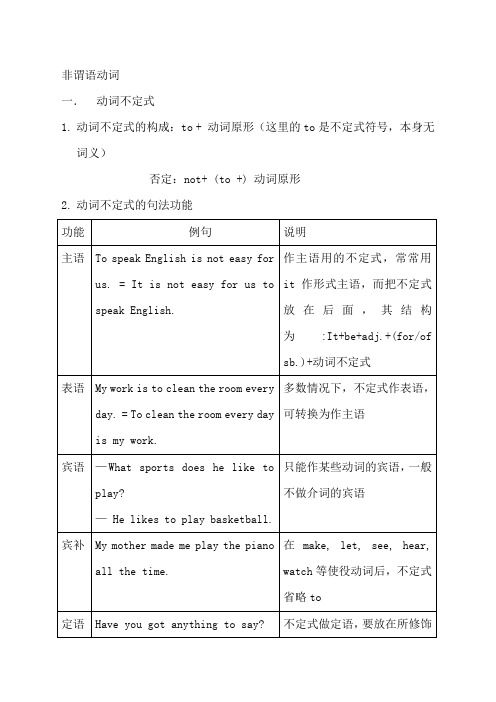非谓语动词及将来时表格归纳
9.-非谓语动词(动词-ing形式和动词-ed-形式)

be addicted to…
沉迷于……
be absorbed in…
全神贯注于……
be aimed at…
旨在/意图……
be armed with…
有……装备
be buried in…
埋葬在……
be based on/upon… be burdened with… be crowded with… be covered with/by… be coated with… be combined with…
8. 固定句型 (1)There is no use/good/sense/harm+doing sth. 做某事没用 (不好/没意义/没有害处) (2)have difficulty/trouble/problems/a hard time/a good time/ fun + (in)+doing (3)spend/waste/lose time (in) doing sth. (4)There is no... + doing sth. (there is no 表“不可能”)
8. get, become, look, seem, appear, remain等系动词后都可跟
done, 表示被动或主语的状态,如remain seated/hidden, get
paid/dressed/changed/stuck/hurt/injured/ burnt等。
注:常用be done+介词短语表示所处的状态,如下:
3.作定语 This is her father’s walking stick.
4.作宾语 When he came in, we all stopped talking.
注意: mind, miss, excuse, enjoy, escape consider, admit(承认),
时态表格+谓语和非谓语

• 谓语
非谓语
• There are some people talking in the sitting room. • He hid behind a wall because he was afraid of letting her see his face. • A group of people had reached his house by then, hoping to kill him. • I will tell you whether you can go with us or not as soon as the meeting is over.
end
--以上表格参见《英语语法实践指南》p/149
学习语法谨记:
每一句话有且只有一个谓语结构。
非谓语 to do / to be done to have done / to have been done to be doing to have been doing doing / done / being done having done / having been done
将来 will do will be doing / will have done / will have
been doing would have been doing
过去 would 将来 do /
would be doing / would be would be done being done
一般进行完成完成进行现在过去将来过去将来一般进行完成完成进行现在过去将来过去将来dobedonebedoingbebeingdonehavedonehavebeendonehavebeendoingdidwasweredonewasdoingwasbeingdonehaddonehadbeendonehadbeendoingwilldowillbedonewillbedoingwillbebeingdonewillhavedonewillhavebeendonewillhavebeendoingwoulddowouldbedonewouldbedoingwouldbebeingdonewouldhavedonewouldhavebeendonewouldhavebeendoing以上表格参见英语语法实践指南p149学习语法谨记
非谓语动词用法表解

非谓语动词用法表解
主动 被动
定语(逻辑主语:修饰的名词或代词) 1.表将来的动作; 2.修饰被序数词、最高级或 no/all/any/only等限定的词; 3.用来修饰的词是抽象名词 1.说明被修饰名词的用途和性能 2.表正在进行(和主动)的动作 (having done/having been done不作定 语) 表已完成和被动 (vi.的-ed形式作定语只表示已完成)
being done having been done
动宾(有些动词只接-ing形式); 介宾; 形容词后宾语
过去 分词
done
X
不定式作动词后的宾语 1. I want to see him. 2. I think it better not to go. 不定式可以作介词but和except的宾语。 1. The teacher made no comments except to tell him to work hard. 老师除了叫他努力学习外,未做任何评价。 2. He had no choice but to sit there as usual. 他没有什 么选择,只好像往常一样坐在那儿。 如不定式前有行为动词do,那么在表语从句中的不定式和介 词except或but之后的不定式可不带to。 1. There is nothing we can do but wait patiently. 我们只 能耐心等待。 2. The only thing I could do was go home. 我能做的唯一 一件事就是回家。 3. They could do nothing but wait for the doctor to come. 他们只能等待医生的到来。
-ing形式作动词的宾语 能用-ing形式作宾语的及物动词可分两类,一类是只能用ing形式作宾语,另一类是既可用-ing形式作宾语,也可用不 定式作宾语。 ①只能用-ing形式作宾语的动词 这类动词只能用-ing形式作宾语,不能用不定式作宾语。 Fancy meeting you here! 想不到在这儿见到你了! I suggest doing it in a different way. 我建议用另一种方 法做这件事。 必背: 只接动词的-ing形式而不接不定式作宾语的动词有 admit 承认/ dislike 嫌恶/ include 包括/ mind 介意/ consider 考虑/ excuse 原谅/ mention 提及/ forgive 原谅 / appreciate 感激/ avoid 避免/ keep 保持/ escape 避免/ delay 耽搁/ fancy 想不到/ cannot help 情不自禁/ enjoy 喜欢/ feel like 意欲/ give up 放弃/ imagine 设想/ finish 完成/ practise 练习/ miss 逃过/ resist 抵制/ put off 推迟 / risk 冒险
非谓语动词图表

非谓语动词图表(总8页)--本页仅作为文档封面,使用时请直接删除即可----内页可以根据需求调整合适字体及大小--非谓语在句中充当除谓语以外的句子成分的动词形式叫做非谓语动词。
非谓语动词分为三种形式:不定式、动名词和分词(分词包括现在分词和过去分词)逻辑主语与真正主语真正主语:谓语动作发出者,即真正主语。
逻辑主语:非谓语动作的发出者或者承受者。
构成非谓语动词句型的首要条件:逻辑主语与真正主语一致。
To acquire knowledge , you must study解析:条件:此句真正主语:you 逻辑主语:you 主语一致。
结论:可构成非谓语句型非谓语使用条件一个句子当中,已经存在一个主句(谓语动词),又没有连词的情况下She got off the bus but left her handbag on her seat.She got off the bus, leaving her handbag on her seat.非谓语动词做主语的区别:1. ________ a language requires time and effort.A. LearnB. LearningC. To learnD. Being learned2. It is not always easy ________ invitations.A. to refuseB. refusingC. to be refusedD. being refused3. How __________ the problem will be discussed at tomorrow’s meeting.A. to solveB. to be solvedC. being solvedD. solving4. It __________ forty-five minutes __________ there by bus.A. cost, to getB. takes, gettingC. takes, to getD. takes, to get to5. It is no good __________. You should give_________.A. to smoke, it upB. smoking, it upC. smoking, up itD. to smoke, up it1. He gave us some advice on how ____ English.A. learningB. learnedC. to learnD. learn2. It ’s a pay day, and they are waiting ____.A. payB. payingC. paidD. to be paid3. I don’t know whether you happen, but I’m going to study in the this September . A.to be heard B. to be hearingC.to hear D. to have heard4. I forgot _____ my name when I finished ____ the composition.A. to sign, to writingB. to sign, writingC. signing, writing5. ---You were brave enough to raised objections at the meeting.---Well, now I regret ____ that.A. to doB. to be doingC. to have doneD. having done6. She can’t help ____ the house because she’s busy making a cake.A. to cleanB. cleaningC. cleanedD. being cleaned1. Her wish is __________ an engineer.A. becomingB. becomeC. to becomeD. being comepeople’s greatest pleasure is __________.A. fishingB. to fishC. to be fishingD. being fish3. The report was so _______ that they were all __________.A. inspiring, excitingB. inspiring, excitedC. inspired, excitedD. inspired, exciting4. ---“You look pale.”---“I feel a little __________.”A. tireB. tiredC. tiringD. tiresome非谓语动词做定语的区别:1. She said she had a important meeting ______.A. to attend inB. to attendC. attendD. attending2. He is always the first ______ questions.A. to answerB. answeringC. to be answeredD. being answered3. The Olympic Games _______ in the year 2016 will be a great success.A. being heldB. to be heldC. heldD. to hold4. The first textbooks ____ for teaching English as a foreignlanguage came out in the 16th century.A. having writtenB. to be writtenC. being writtenD. written5. At present, English is the main subject ___________ here.A. to be taughtB. being taughtC. teachingD. to be teaching6. ---"Who are those people with the banner"---"A group _______ itself the League for peace."A. callingB. callsC. calledD. is called7. The pen __________ belongs to me.A. which it is on the tableB. lying on the tableC. is on the tableD. which on the table1. I have enjoyed my visit here. I'll be very sorry __________.A. for leavingB. of leavingC. to leaveD. left2. I went to see him __________ him out.A. findingB. findC. only to findD. only found3. __________ the cry for help, people immediately rushedout of the rooms.A. To hearB. HearingC. Having heardD. They hearing4. __________ Hello, he reached out his hand.A. SaidB. SayingC. Talked aboutD. Talking to5. _________ from the tallest building, the whole city looks very beautiful.A. SeeB. SawC. SeeingD. Seen6. ___________ the past, our life is much better.A. Comparing withB. Be compared withC. To compare withD. Compared with非谓语动词做宾语补足语的区别:1. The doctor advised Lao Li __________ more rest.A. that he getB. to getC. would getD. get2. Soon they saw the boy _________ in the crowd.A. disappearB. to disappearC. disappearsD. disappeared3. Birds are seldom heard __________ at night.A. singB. singingC. to singD. to be singing4. He kept me __________ for many hours.A. to waitB. having been waitedC. waitingD. waited5. Mother caught the boy __________ in the corner.A. smokeB. to smokeC. smokingD. being smoked6. Having read the Emperor's New Clothes, we all found it ___.A. interestB. interestedC. interestingD. to interest7. I need this chapter __________ before tomorrow.A. rewritingB. rewrittenC. rewriteD. to write again8. When she returned home, she found the window open and something __________.A. to stealB. losingC. missedD. stolen9. There was so much noise that the speaker could not make himself _________.A. being heardB. heardC. hearingD. hear非谓语动词的时态和语态:1. around the Water Cube, we were then taken to see the Bird’s Nest for the 2008 Olympic Games. A. Having shown B. To be shown C. Having been shown D. To show2.【2012重庆】______to work overtime that evening, I missed a wonderful film.A. Having been asked B. To ask C. Having asked D. To be asked3.【2008福建】___ in the queen for half an hour, the old man suddenly realized be had left the cheque in the car. A. Waiting B. To wait C. Having Waited D. To have waitedson pretended _______ when I came back.A. to sleep B. sleeping C. being sleeping D. to be sleeping5.【2011上海】Today we have chat rooms, text messaging, emailing…, but we seem _____ the art of communicating face-to-face.A. losing B. to be losing C. to be lost D. having lostis the man ____now?A. operating on B. operated on C. being operated on D. to be operated onquestion ______ now at the meeting is not the question ______ yesterday.A. discussed; discussed B. discussing; had discussedC. being discussed; discussed D. discussing; discussingasked ___ to work in the countryside.A. to be sent B. to send C. to be sending D. sendinga letter, he decided to send a telegram.A. Not receiving B. Receiving not C. Not having received D. Having not received10The purpose of new technologies is to make life easier, ______ it more difficult.A. not make B. not to make C. not making D. do not make独立主格结构1)独立主格结构的逻辑主语与句子的主语不同,它独立存在。
非谓语动词表格形式

非谓语动词一.动词不定式1.动词不定式的构成:to + 动词原形(这里的to是不定式符号,本身无词义)否定:not+ (to +) 动词原形2.动词不定式的句法功能1.to do 作主语常用it 作形式主语例: To learn English well is useful. → It is useful(for us)to learn English well.注意:在kind, good, nice, clever等表示人的品质的形容词后,不用for而用of.2.一些表示命令,打算或希望的动词后只接动词不定式作宾语:would like, like(想要), want, wish, hope, decide, plan, except等。
例:Would you like too see a film this evening?3.在find, think后跟动词不定式作宾语时,常用it代替,而将真正的宾语放在句末。
例:I find it easy to read English every day.4.常见的一些不带to 的动词不定式作宾语Why not do ……, why don’t you do…, had better (not) do…, would rater do…, could/ would/ will you please (not) do…例: I would rather stay in the room.5.一些使役动词和感官动词用不定式作宾语,但to要省略。
一感(fell)、二听(hear, listen to)、三让(let/ make/ let)、四看(look at, see, watch, notice)、五帮助(help),但变为被动语态是必须加上to.例:My friends were made to work the whole night by the boss.6.不定式常和疑问词what,which,when,where,how连用,相当于一个宾语从句。
非谓语动词用法总结

非谓语动词用法总结非谓语动词是历年高考英语的重要考点之一,同时也是较难掌握的难点之一。
它贯穿于英语学习和考试过程的始终。
但是,只要认真分析、透彻理解、看透本质、准确把握,就一定能在高考中运筹帷幄,游刃有余。
一.非谓语动词区别简表二.不定式的用法不定式不可作谓语,但它可以有自己的宾语、状语,构成不定式短语,在句中可以作主语、宾语、表语、定语(表用途)、状语或补足语。
高考对不定式的考查主要有不定式的时态、语态、作用、否定、省略、连词+不定式等。
作主语不定式作主语表示具体的动作,通常指一件已知的事或目的。
不定式作主语时,谓语动词用单数。
eg:To say is a thing,to do is another.(说是一回事,做是另外一回事。
)(2)不定式短语较长时,通常放在谓语之后,用it作形式主语。
eg:①It is important to learn English well.(学好英语是重要的。
)②It is necessary for us to do the job well.(我们做好这项工作是必要的。
)③It is a great honor to be invited to give a speech here.(被邀请在这儿发表演讲是一个极大的荣幸。
)2.作宾语(1)常只用不定式作宾语的动词有:want,wish,hope,long,expect,desire,intend,decid e,ask,promise,aim,offer,agree,plan,learn,choos e,refuse,fail,manage,pretend等。
eg:①He refused to help me.(他拒绝帮助我.)②She has agreed to come tomorrow.(他已同意明天来.)(2) 不定式较长时,作宾语,也可用it代替,放在后面。
eg;I find it difficult to do the job well.(3) “特殊疑问词﹢不定式to do结构”具有名词特征,可作宾语。
非谓语动词用法表解自己整理(终极)

表1:非谓语动词的时态和语态
概说:非谓语动词指动词的不用于作谓语的三种变化形式,即:不定式、V-ing形式(据其在句子中的作用又分为动名词和现在分词)、过去分词。
它们具有如下共同特征:无人称与数的变化;有时态和语态的变化、有主语(逻辑的)、可以带状语、及物动词或及物性短语动词变来的非谓语动词有其自身的宾语。
否定式都在前加not。
能作谓语以外的很多成分。
表2:非谓语动词的句法功能(1)
表3:非谓语动词的句法功能(2)
表4:非谓语动词的句法功能(3)。
非谓语动词(动词-ing形式和动词-ed形式)

01
02
短暂动词(即瞬间动词)的现在分词被动式不可作宾语补足语或定语。例如:
He saw the old man knocked down by the car. (knocked down不可改为being knocked down或having been knocked down)
v.-ed 形式
spend/waste/lose time (in) doing sth.
There is no... + doing sth. (there is no 表“不可能”意点 作状语用的现在分词,其逻辑主语必须同句中主语为同一人或同一事。例如: Standing on top of the tall building, we could see the whole city.(正) (Standing=When we stood) Standing on top of the tall building, the whole city could be seen.(误)
×
made(表被动)
gone(表完成)
v.-ing 作主语 Seeing is believing. 注意: it作形式主语时,可用动词不定式,但下列句型常用动名词: It is + no good (no use, fun, a waste of time) +doing…
2.作表语 His job is washing and cooking. 3.作定语 This is her father’s walking stick. 4.作宾语 When he came in, we all stopped talking. 注意: mind, miss, excuse, enjoy, escape consider, admit(承认),advise, appreciate, avoid, finish, face, practise, suggest, stop, delay, imagine, include, keep, quit, resist, pay attention to等动词以及介词后接动名词作宾语。
- 1、下载文档前请自行甄别文档内容的完整性,平台不提供额外的编辑、内容补充、找答案等附加服务。
- 2、"仅部分预览"的文档,不可在线预览部分如存在完整性等问题,可反馈申请退款(可完整预览的文档不适用该条件!)。
- 3、如文档侵犯您的权益,请联系客服反馈,我们会尽快为您处理(人工客服工作时间:9:00-18:30)。
非谓语动词的用法
在英语语法中,掌握好动词的用法是最重要的,而非谓语动词又是动词中非常重要的一部分,由于它们内容多,有些用法相似,所以不好掌握,经常被混淆用错,下面通过列表比较的方式,分析非谓语动词的主要用法。
非谓语动词和谓语动词的相对时间关系
二.非谓语动词的被动语态1. 非谓语动词被动语态的意义
2. 一般现在分词,完成的现在分词和过去分词表示被动意义的区别
三.非谓语动词的句法作用
1. 非谓语动词的句法作用一览表
2. 非谓语动词作主语
3. 非谓语动词作宾语
4. 非谓语动词作表语
5. 非谓语动词作定语
6. 非谓语动词作状语
7. 非谓语动词作同谓语
8. 非谓语动词作插入语
四. 非谓语动词的特殊形式
五. 非谓语动词的否定形式
英语中将来时的表示形式
表示将要发生的动作和状态在英语中用将来时,将来时在英语中有多种表达形式,为了掌握它们的区别和用法,下面笔者对它们进行分类总结。
